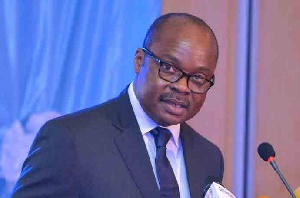In spite of some external shocks faced by the Ghanaian economy, the Bank of Ghana (BoG) says it will continue to take the necessary measures to consolidate the gains made so far.
Governor, Dr Ernest Addison stressed it was important not to erode the gains made in the last two years.
Speaking to reporters in Accra yesterday over concerns about the decline in the country’s international reserves as well as the performance of the local currency, Dr Addison said the central bank had to make sound judgement as to how much depreciation relative to reserve accumulation was permissible.
Ghana’s gross international reserves declined from $7.6 billion (4.3 months of import cover) at the end of December 2017 to $7.0 billion (3.7 months of import cover) in 2018, according to data from the BoG.
The local currency is currently trading at GH?4.9 per dollar on the inter-bank market and GH?5.0194 at the forex markets.
“It’s important not to unwind the gains that we have made in the last two years; we spent two years bringing inflation down from 15% to 11% to 9.4%; if we allow the exchange rate to move too fast, we are going to negate the progress that we have made in terms of the price stabilisation,” the Governor explained at a news conference after its meeting to review the health of the economy.
He explained further that the Bank had to undertake some balancing acts ,given the external shocks that were facing the economy, noting that “ we need to make a judgement to make a reserve reduction to stabilize the currency but you also don’t want to lose all your reserves in the process of trying to stabilise the cedi.”
BoG defends cedi’s performance
According to the Governor, even though the cedi depreciated 8.39 % in 2018, when compared with other emerging frontier markets, the cedi did relatively well.
The South African rand depreciated by 15.7% at the same time; the Indian rupee depreciated by 10%; the Turkish lira depreciated by 42% while the Brazilian real depreciated by 18.32%.
Maintaining a stable but flexible exchange rate system
It was, according to Dr Addison important to build reserves to moderate the speed of depreciation of the currency.
Responding to questions on whether a flexible or fixed exchange rate will better serve an economy like Ghana’s, Dr Addison said, “over the years we have agreed that a flexible exchange rate system is the way to go and it better swerves the needs of a country like Ghana.”
BoG cuts rate by 100 basis points
Lending rates are expected to drop with the reduction in the BoG’s benchmark interest rate. Dr Addison at the same briefing announced a reduction its key lending rate to commercial banks to settle at 16%, a 100 basis points reduction, the first time since March 2018 that the rate has seen a decline for universal banks.
In March 2018, the Bank of Ghana reduced its rate by 200 basis points from 20 per cent to 18 per cent. the move was influenced by a fairly stable outlook for the economy.
said they are also convinced about measures government is taking to stabilize the economy and check its rising expenditure.
Business News of Wednesday, 30 January 2019
Source: thefinderonline.com













